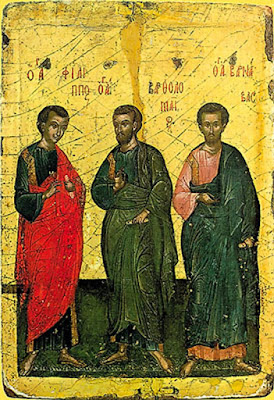ST. BARNABAS THE APOSTLE (JUNE 11TH)
 |
| Apostle, Martyr, and Son of Consolation |
Compiled and Edited By Bp. Joseph (Ancient Church of the West)
INTRODUCTION
Saint Barnabas, counted among the glorious company of the Apostles though not of the Twelve, was a Levite of Cyprus, born with the name Joseph, but surnamed Barnabas—“Son of Consolation”—by the Apostles (Acts 4:36). This name became not only his title but the very character of his life: a man whose presence brought comfort, reconciliation, and apostolic boldness wherever he was sent.
EARLY LIFE AND CONVERSION
Though born among the Jewish diaspora, Barnabas was thoroughly trained in the Law of Moses and the customs of Israel. It is likely that he, like Saint Paul, studied in Jerusalem under Gamaliel. Tradition holds that Barnabas was among the Seventy disciples whom the Lord sent out during His earthly ministry (Luke 10:1), and that he may have seen Christ in the flesh, becoming a witness of the Resurrection shortly after the Ascension.
He was among the earliest to accept the Gospel in Jerusalem and distinguished himself by selling all he had and laying the proceeds at the Apostles’ feet (Acts 4:37). Thus began his life of total consecration and apostolic service.
RECONCILER AND BROTHER TO SAINT PAUL
When Saul of Tarsus, the former persecutor, sought to join the Church after his conversion, the believers were afraid. But it was Barnabas who took him by the hand and brought him to the Apostles, testifying to his conversion and bold preaching in Damascus (Acts 9:26–27). Without Barnabas, Paul’s ministry might have languished in obscurity or suspicion.
Later, when the Church in Antioch began to flourish among the Gentiles, Barnabas was sent from Jerusalem to encourage them. Rejoicing in the grace of God, he exhorted them all to cleave unto the Lord with steadfast purpose (Acts 11:23). The Scriptures say of him: “He was a good man, and full of the Holy Ghost and of faith” (Acts 11:24).
Perceiving the need for further instruction in Antioch, he went to Tarsus to find Paul and brought him back, thus forging the missionary companionship that would transform the Gentile world.
MISSIONARY JOURNEYS AND APOSTOLIC LABOR
Together with Paul, Barnabas was set apart by the Holy Ghost and ordained by the Church in Antioch to undertake the first apostolic mission to the Gentiles (Acts 13:2–3). Their travels took them to Cyprus—his homeland—and to the cities of Asia Minor, where they preached Christ boldly, endured persecution, and established churches.
In Lystra, the people mistook Barnabas for Jupiter (Zeus) and Paul for Mercury (Hermes), so dignified and noble was Barnabas’ bearing (Acts 14:12). He suffered alongside Paul in every danger, bearing witness to Christ in synagogues and marketplaces, amidst joy and suffering.
Yet, even Apostles contend. A sharp disagreement arose between Barnabas and Paul concerning John Mark, Barnabas’ kinsman. Barnabas, ever the consoler, desired to give the young man another chance; Paul, cautious and pragmatic, refused. So they parted ways in peace (Acts 15:39), and Barnabas sailed to Cyprus to continue the work.
 |
| A Byzantine Icon of Sts. Paul, Barnabas and Bartholomew, Reprinted by Uncut Mountain Church Supply |
MARTYRDOM AND LEGACY
According to early tradition, Barnabas continued to preach in Cyprus, converting many and establishing firm churches. He is believed to have been martyred in Salamis around AD 61, stoned by the unbelieving Jews in a synagogue. Before his death, he handed a copy of the Gospel of Matthew—written in his own hand—to his nephew Mark, entrusting the witness of Christ to the next generation.
His body was buried with reverence, and his memory kept with honor by the Church in Cyprus, which later claimed apostolic independence on the strength of his labors.
SAINTLY CHARACTER AND PATRISTIC WITNESS
Saint Barnabas is remembered by the Fathers not only as a preacher, but as a man of gentleness, generosity, and apostolic mercy. Saint John Chrysostom commended him for his capacity to heal division, and Saint Bede the Venerable placed him among the bright lights of the apostolic age.
Some ancient writings, such as the Epistle of Barnabas, were once read in the early Church, though not counted among the canonical Scriptures. While its authorship remains uncertain, its existence testifies to the veneration and memory of Barnabas among the early faithful.
COLLECT
O Lord God Almighty, who didst endue thy holy Apostle Barnabas with singular gifts of the Holy Ghost, and didst set him apart for the work of reconciliation and evangelism: Grant, we beseech thee, that by his example and prayers, thy Church may be filled with comfort and courage, and thy Gospel proclaimed with boldness and grace; through Jesus Christ thy Son our Lord, who liveth and reigneth with thee and the Holy Ghost, ever one God, world without end. Amen.


Comments
Post a Comment